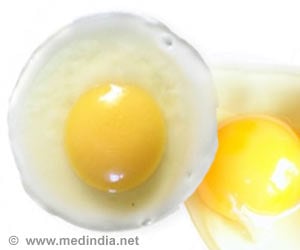
‘Frequent consumption of eggs does not increase the risk of cardiovascular diseases.
’
Tweet it Now
Furthermore, no association was found among those with the APOE4 phenotype, which affects cholesterol metabolism and is common among the Finnish population.In the majority of population, dietary cholesterol affects serum cholesterol levels only a little, and few studies have linked the intake of dietary cholesterol to an elevated risk of cardiovascular diseases. Globally, many nutrition recommendations no longer set limitations to the intake of dietary cholesterol.
The study did not establish a link between dietary cholesterol or eating eggs with thickening of the common carotid artery walls, either. The findings are published in the American Journal of Clinical Nutrition.
The findings suggest that a high-cholesterol diet or frequent consumption of eggs do not increase the risk of cardiovascular diseases even in persons who are genetically predisposed to a greater effect of dietary cholesterol on serum cholesterol levels.
Source-ANI















